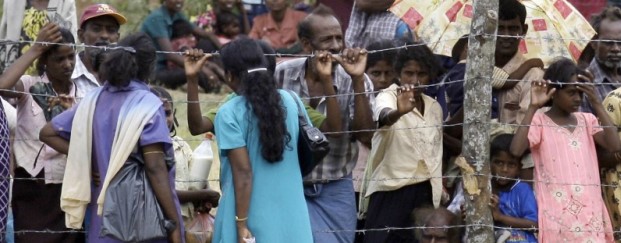Panelists included Attorney-at-Law A.M. Faaiz, Bhavani Fonseka Senior Researcher and attorney from the Centre for Policy Alternatives and TNA Parliamentarian M.A. Sumanthiran.
SACLS’s report, “From Words to Action: A Roadmap for Implementing Sri Lanka’s Transitional Justice Commitments“, comes at a time of heightened political and domestic tensions surrounding the role of international participation in the investigation of human rights abuses during the island’s bloody civil war between LTTE separatists and government forces.
Policy shifts
In a recent interview with BBC Sinhala, President Sirisena backed away from implementing tenets of the HRC resolution concerning the role of international actors.
“The international community need not worry about matters of state interest,” Sirisena told BBC Sinhala.
Sirisena also appeared to contradict Foreign Minister Mangala Samaraweera, who told Swarajy Magazine in January 2015 “We hope for technical assistance from the UN, perhaps judges from the Commonwealth – whom we chair at the moment – too.”
HRC Resolution 30/1 affirms “the importance of participation in a Sri Lankan judicial mechanism, including the special counsel’s office, of Commonwealth and other foreign judges, defence lawyers and authorized prosecutors and investigators.”
“The participation of international players is absolutely essential for any sense of credibility,” says Sumanthiran. As for investigations into alleged human rights abuses, Sumanthiran says “There will be a temptation not to dig too deep because the wound is not completely healed… If not, an amputation might be necessary.”
Foreign Influence
A recent visit by UN High Commissioner for Human Rights Prince Zeid roused many opposition forces, who have raised the specter of “foreign tribunals” prosecuting Sri Lankan soldiers. At least two joint opposition rallies were staged in response to Zeid’s visit, one of which drew nearly a hundred protesters to Lipton Circle, a popular spot among tourists.
“The first duty of the Sri Lankan government is to see to it that the interests of our war heroes are looked after,” wrote former President Mahinda Rajapaksa in a Colombo Telegraph opinion piece.
The Disappeared
Another major element of the report is the establishment of an Office of Missing Persons, but questions remain as to the temporal mandate of such an office.
“I don’t think there should be a temporal scope at all, says Sumanthiran. “I don’t think anything prevents us from looking into what happened 100 years ago.”
In a recent controversial gaffe, Prime Minister Wickremesinghe intimated that most of the disappeared persons are “probably dead.” It has been estimated that 40,000 people may be unaccounted for, including not only LTTE fighters, but also journalists and activists.
The International Committee of the Red Cross (ICRC), which has been registering disappearances for the past two decades, documented 16,064 missing persons in its 2014 Annual Report.
A movement is currently underway to issue missing person certificates. Seen widely as another step toward reconciliation, the announcement of the certificate initiative was also met with hostility from opposition forces who are increasingly suspicious of foreign influence. The certificates could serve as one mechanism for victims to receive reparations from the government, as well as for other practical purposes including land deeds and pension funds.
Reparations
The report also calls for the establishment of an Office Of Reparations in order to “build trust and acknowledge the dignity of victims.”
“I don’t think the government has taken a clear policy on reparations” says Foneska of the Centre for Policy Alternatives, citing Colombia as one potential model. In December 2015, the Colombian government and FARC rebels signed an agreement on reparations for war victims.
Back at the panel, A.M. Faaiz concluded his remarks on the subject of truth and accountability for victims: “It’s not only their right, it’s also essential in healing and moving forward.”
